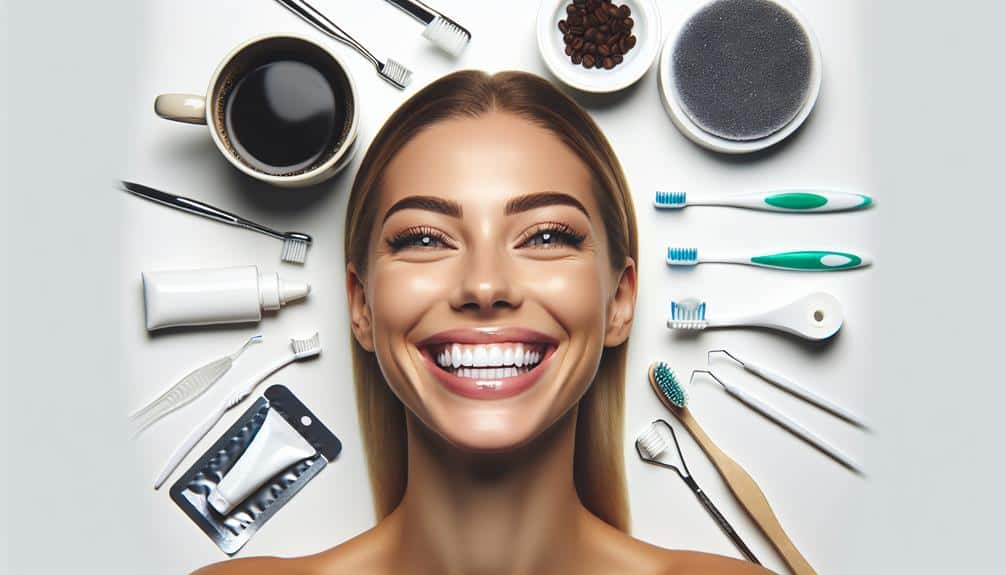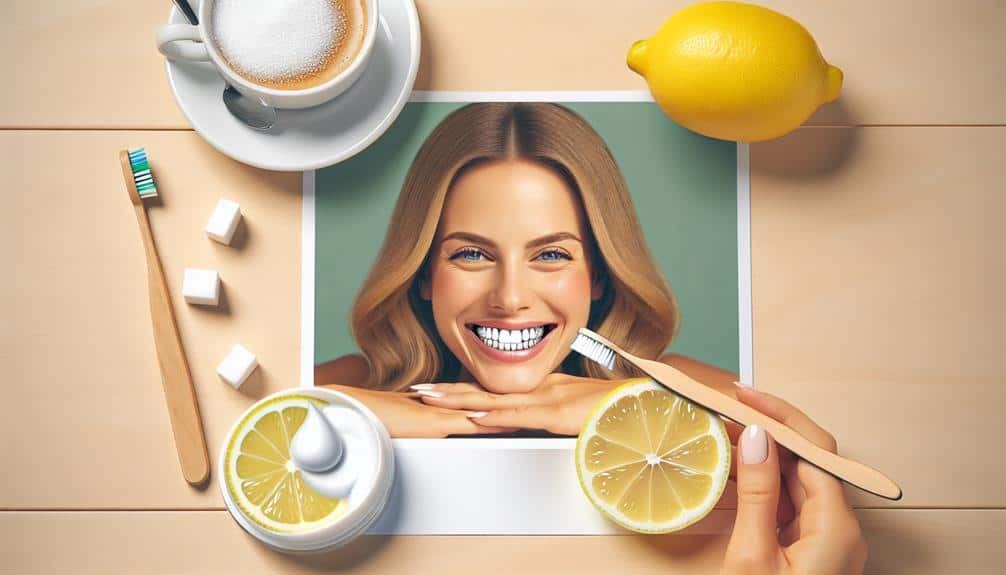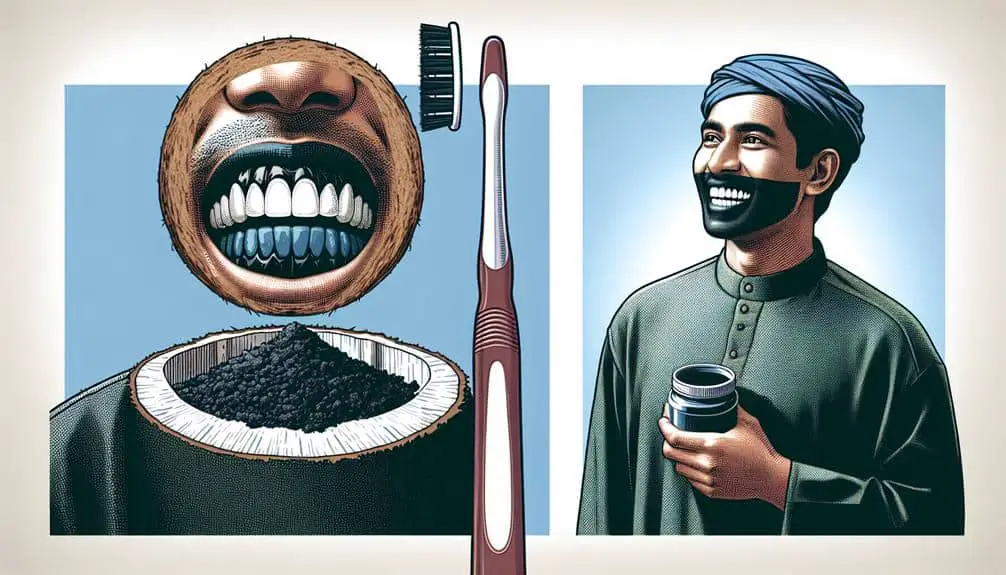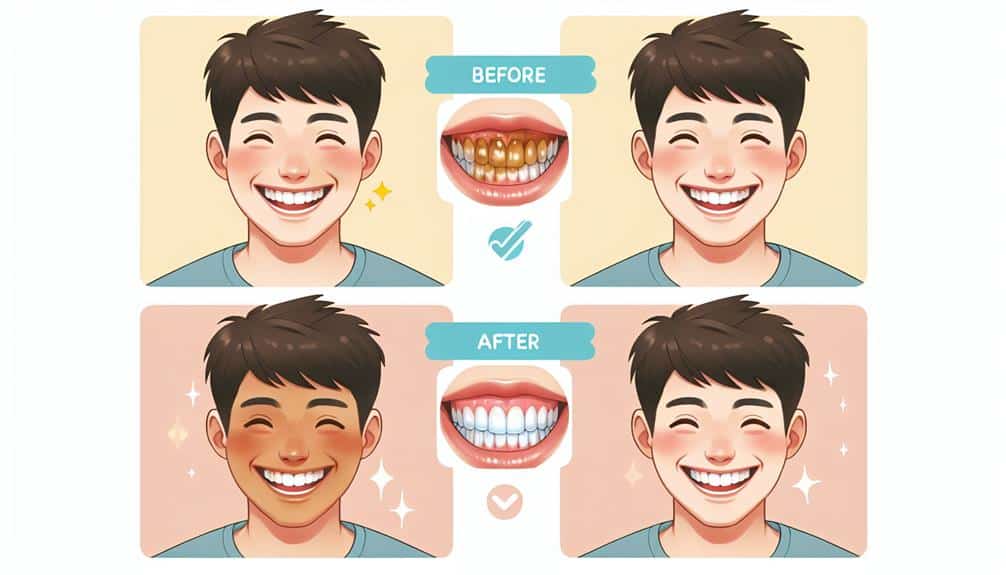To remove coffee stains from your teeth, brush diligently with a soft-bristled brush and whitening toothpaste. Gently scrub to break down stains without harming enamel, focusing on stained areas. Implement flossing into your routine, rubbing along each tooth's sides. Try natural remedies like activated charcoal or baking soda for brighter teeth. Consider professional treatments like laser whitening or custom bleaching trays. Prevent stains by regular dental cleanings, dietary changes, and rinsing after drinking coffee. By reducing coffee intake and maintaining good oral hygiene, you can keep your smile sparkling. Additional methods can provide lasting effects.
Key Points
- Brush teeth with whitening toothpaste and soft-bristled toothbrush.
- Use activated charcoal or baking soda for natural whitening.
- Seek professional treatments like laser whitening or bleaching trays.
- Maintain oral hygiene with regular cleanings and flossing.
- Implement preventive measures like rinsing after consuming coffee.
Brushing Techniques for Coffee Stains
To effectively remove coffee stains from your teeth, brush using a soft-bristled toothbrush and a whitening toothpaste twice a day. Gentle scrubbing is key to breaking down the stains without damaging your enamel. Make sure to focus on each tooth surface, giving special attention to areas where stains are significant.
Incorporating flossing into your daily routine also plays an essential role in preventing and reducing coffee stains. Flossing helps remove plaque and debris between your teeth, which can contribute to discoloration. Try using flossing tricks like gently rubbing the floss up and down along the sides of each tooth to guarantee a thorough clean.
Natural Remedies for Teeth Whitening
Consider incorporating natural remedies like activated charcoal or baking soda into your oral care routine for teeth whitening. These DIY tricks are cost-effective and can be easily incorporated into your daily routine.
Activated charcoal, known for its absorbent properties, can help remove stains from the surface of your teeth. You can use it by dipping a wet toothbrush into powdered charcoal and gently brushing your teeth for a couple of minutes before rinsing thoroughly.
Another option is baking soda, which has mild abrasive qualities that can help scrub away stains. Simply mix a small amount of baking soda with water to form a paste and brush your teeth gently with it.
In addition to these herbal solutions, making dietary changes like reducing your intake of coffee, tea, and red wine can prevent further staining. Home remedies such as oil pulling with coconut oil or using hydrogen peroxide diluted with water as a mouthwash can also aid in maintaining a brighter smile.
Experiment with these natural methods to find what works best for you in achieving a whiter smile.
Professional Whitening Treatments
Exploring professional whitening treatments can greatly enhance the brightness of your smile with long-lasting results.
Two common professional whitening methods are laser whitening and bleaching trays.
Laser whitening, also known as power whitening, is a popular in-office procedure where a bleaching agent is applied to your teeth, and a laser is used to enhance the whitening process. This method is efficient and can provide noticeable results in just one session.
On the other hand, bleaching trays are custom-made trays filled with a bleaching solution that you can use at home. The trays are worn over your teeth for a specified period, allowing the bleaching agent to work its magic gradually. This method is convenient and allows for more flexibility in your whitening schedule.
Both laser whitening and bleaching trays can effectively remove coffee stains from your teeth, giving you a brighter and more confident smile.
Preventive Measures for Stain Reduction
Taking proactive steps to prevent stains on your teeth can help maintain a bright and healthy smile. Regular cleanings by a dental professional are essential in preventing the buildup of stains caused by coffee and other pigmented foods and drinks. These cleanings remove surface stains and tartar that can contribute to discoloration. It's recommended to schedule regular cleanings at least twice a year to keep your teeth looking their best.
In addition to professional cleanings, making dietary changes can also help reduce the risk of coffee stains on your teeth. Avoiding prolonged exposure to staining beverages like coffee and tea can make a significant difference. If you do consume these beverages, consider using a straw to minimize contact with your teeth. Rinsing your mouth with water after consuming coffee can also help reduce the chances of stains setting in.
Lifestyle Changes for Whiter Teeth
To achieve whiter teeth, incorporating lifestyle changes such as reducing coffee intake and practicing good oral hygiene habits is essential. Dietary adjustments play an important role in maintaining the brightness of your teeth. Limiting the consumption of coffee, tea, and other staining beverages can prevent further discoloration. Additionally, increasing your intake of water and foods like apples or carrots, which can help naturally clean your teeth, can contribute to a brighter smile.
Incorporating proper oral hygiene practices is also essential for achieving whiter teeth. Brushing your teeth at least twice a day and flossing regularly can help remove surface stains and prevent plaque buildup, which can lead to discoloration. Consider using a whitening toothpaste to help combat stains effectively.
While lifestyle changes can improve the color of your teeth, for more stubborn stains, cosmetic procedures or home remedies may be necessary. Consulting with a dental professional can provide you with tailored solutions such as professional whitening treatments or at-home whitening kits to enhance the whiteness of your teeth.
Frequently Asked Questions
Can Coffee Stains on Teeth Lead to Other Dental Issues Besides Discoloration?
Coffee stains on teeth can lead to more than just discoloration. Neglecting oral health due to coffee consumption can result in enamel erosion, causing long-term damage. Maintaining good oral hygiene is essential to prevent such issues.
Are There Any Specific Foods or Drinks to Avoid to Prevent Coffee Stains From Forming on Teeth?
To prevent coffee stains on your teeth, consider dietary restrictions and lifestyle changes. Avoiding dark-colored beverages like coffee and tea can help. Maintain good oral hygiene through preventive measures like regular brushing and dental check-ups for best dental health.
How Long Does It Typically Take to See Results When Using Natural Remedies for Teeth Whitening?
When using natural remedies for teeth whitening, you can expect quick results in about 1 to 2 weeks. Consistent use of these remedies like baking soda or activated charcoal can show visible improvements in your smile.
Are Professional Whitening Treatments Safe for Individuals With Sensitive Teeth?
If you have sensitive teeth, professional whitening treatments are generally safe, but may cause discomfort. Consider alternatives like at-home kits or natural remedies. Guarantee proper enamel protection. Effectiveness varies, yet sensitivity concerns are manageable.
Can Smoking or Certain Medications Affect the Effectiveness of Whitening Treatments for Coffee Stains on Teeth?
Smoking can reduce the effectiveness of whitening treatments on coffee-stained teeth. Certain medications may also disrupt. It's important to take into account these factors when looking for professional whitening options for best results and to consult with your dentist.



